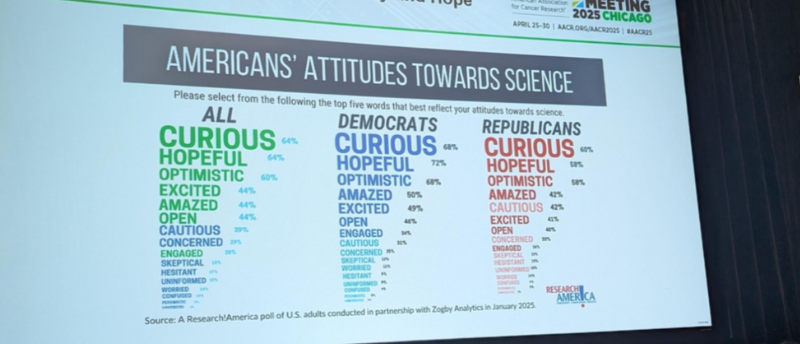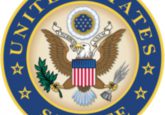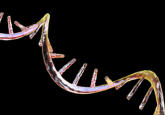Standing up for cancer research at AACR

Standing ovation for AACR president in rousing call to action for the research community’s response to funding cuts.
Five times I have been to the American Association for Cancer Research’s (AACR’s) Annual Meeting, and this is the first time I have seen a standing ovation delivered mid-session. I was absolutely blown away by the panel, ‘Cancer Research at a Crossroads: Sustaining Progress Against Cancer for the Benefit of Patients’, which discussed the impact of funding cuts on cancer research.
It started with author, journalist and cancer survivor Clifton Leaf deftly making the point that, while Americans are divided on a seemingly overwhelming number of issues – with even the police procedurals they watch, foods they eat and cars they drive divided along party lines – there is one thing they all agree on: the importance and value of science.
Republican and Democrat voters alike overwhelmingly support the statement that the advancement of knowledge through research is something to be prioritized and supported, and they even respond with the same key words – curious, hopeful, optimistic – as to their opinions towards science. All this, Clifton highlights, begs the question: why halt funding for this one unifying aspect of American society?

NIH freezes rock the research world
How has the scientific community responded to freezes in NIH reviews, travel and communication?
This question was followed by AACR Past President Patricia LoRusso (Yale University, CT, USA), who passionately described the widespread disruption to the research pipeline, quoting some devastating statistics on the number of established researchers leaving their professions early and early career researchers who have been dissuaded from pursuing their careers further.
What’s more, LoRusso revealed that a recent AACR survey found one in four cancer clinical trials had been postponed: a terrible stat, and something that LoRusso highlighted should not just be considered in terms of data. The devastating human impact on real lives was emphasized later in the session with talks from Larry Saltzman (Leukemia and Lymphoma Society; NY, USA) and Kristen Dahlgren (Cancer Vaccine Coalition), who both shared their complex and long-term battles with cancer, in their own lives and those of their families. Both shared examples of clinical trials and research developments that saved their lives and lamented that delayed research leads to lives destroyed.
The communication problem
Their talks also highlighted that science has a communication problem, an issue picked up by former National Cancer Institute (NCI; MD, USA) director Kimryn Rathmell and E. John Wherry, Director of Immunology and Immune Health at the University of Pennsylvania (PA, USA).
Kimryn relayed her experiences of speaking to care home residents, who proved to be one of the most engaged audiences she had ever had, but who are so often overlooked, and emphasized the importance of engaging with people outside the scientific echo chamber.
Meanwhile, Wherry highlighted key facts regarding the economic impact of scientific funding that should align with the current administration’s targets to stimulate the economy and champion self-sufficiency.
Just a few examples included that US$100 million of research funding leads to over 70 patents, which in turn generate over US$600 million in economic activity, making investment in this area 20% more likely to stimulate economic activity than others. On the jobs front, Wherry revealed that in Pennsylvania, about 20,000 jobs were directly reliant on National Institutes of Health (NIH) funding, but that around 100,000 jobs in the state were indirectly reliant on the NIH. What’s more, he made the point that if the science doesn’t happen in the US, it will happen elsewhere, meaning that drugs will be manufactured abroad and the US will be dependent on buying them from other countries, a fact that contradicts the administration’s stance on national security and self-sufficiency.
A message of hope
These presentations were paired with a message of hope from Monica Bertagnolli, former director of the NIH and NCI, who highlighted the impartiality of the employees of these institutions, revealing them not to be political people but individuals dedicated to stretching funding as far as it can go to impact as many American lives as possible.
With this in mind, she focused on the positives, affirming that the position we are in is not hopeless! Cancelled programs have been brought back and discarded employees have been rehired as a result of researchers speaking up and fighting for their reinstatement. The administration can listen, but recognition must be hard fought, so now, more than ever, researchers must keep fighting for their science.
Each of these presentations was extraordinarily praiseworthy, but it was LoRusso’s closing lines, following her revelation that 68% of researchers surveyed had received guidance on how to reframe their research and change the language used to avoid triggering responses to ‘politically sensitive’ research, that brought the audience to their feet. To LoRusso, this is not just about semantics and rhetoric, but about maintaining the independence of scientific research, leading her to conclude: “Every one of us matters, every voice is important. This is the moment to consider what this community stands for… and what we need to stand up to.”
This rousing call to action landed right at the heart of the audience and, within seconds, was taken quite literally, as the hundreds of attendees in the hall stood to applaud the AACR President.





